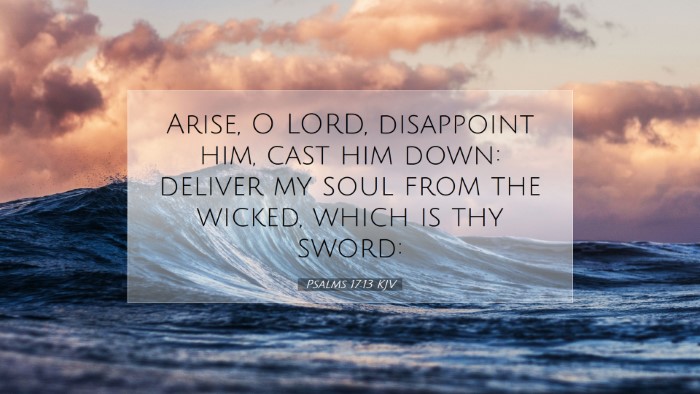Commentary on Psalms 17:13
Psalms 17:13 (KJV): "Arise, O Lord, disappoint him, cast him down: deliver my soul from the wicked, which is thy sword."
Introduction
This verse from Psalm 17 encapsulates a deep plea for divine intervention against the wicked, specifically those who seek the psalmist's harm. It succinctly portrays the conflict between a faithful follower of God and those who oppose him. Commentaries from respected theologians provide insightful interpretations that address the spiritual and relational dimensions inherent in this request.
The Plea for Divine Intervention
In this passage, the psalmist directly appeals to God, indicating a relationship of trust and urgency. This invocation serves as a reminder to the faithful that turning to God in their distress is both an obligation and a necessity. Henry highlights that this expression of need reflects a heart reliant on God’s strength amidst vulnerabilities.
Matthew Henry elucidates that the 'Arise, O Lord' signifies a call for God to take action on behalf of His people. Here, the psalmist desires for God to awaken from silence and demonstrate His power against those who perpetrate evil.
Disappointment and Displacement of the Wicked
The specific request to "disappoint him" suggests a desire for the plans of the adversary to be thwarted. The use of 'him' is crucial; it points to an individual or collective force that represents opposition to the faithful. Albert Barnes notes that this intentional language indicates that the psalmist is not merely interested in personal deliverance but also in God’s justice prevailing over wickedness.
- Thwarting Plans: This can be seen as a cry for God to interfere in the wicked's schemes, aligning with God's overarching will for righteousness.
- Divine Justice: By calling upon God to act, the psalmist acknowledges God's sovereignty and the inherent justice that accompanies His actions.
The Nature of Deliverance
Deliverance is a central theme in this verse, where the psalmist pleads for liberation from those who embody wickedness. Adam Clarke emphasizes that deliverance from the wicked is vital as it aligns with the psalmist's understanding of God as a protector. The psalmist recognizes threats to their spiritual and physical well-being and seeks God as a deliverer.
This denotes not just a physical escape but spiritual assurance. The phrase "which is thy sword" illustrates how these adversaries may serve as instruments of God's judgment or testing, emphasizing that even in adversarial situations, one can discern God’s providential governance.
Theological Implications
This plea encapsulates significant theological threads that deepen one’s understanding of the relationship between God and God’s people in the face of evil. It prompts reflections on the nature of God's response to suffering and injustice.
- The Sovereignty of God: The verse emphasizes that all situations, even dire ones involving wickedness, fall under God’s sovereign control.
- The Role of Prayer: It reaffirms the power and necessity of prayer as a vital means of interaction with God, where believers can voice their needs and seek help.
- Justice and Compassion: Highlights God's desire for justice, which may manifest through divine intervention and a call for the righteous to stand firm amid trials.
Application for Believers
This psalm encourages believers not only to seek God's help in times of trouble but also to maintain trust in Divine justice. A few key applications emerge from this text:
- Reliance on God: Believers are encouraged to lean on God as their stronghold against adversity, reminding them that their struggles are seen and known by God.
- Awareness of Evil: Recognizing the existence of wickedness and evil in the world should call believers to a proactive stance in prayer and action.
- Hope in Deliverance: The promise of God’s eventual justice and deliverance from trouble cultivates a hope that sustains the faithful through trials.
Conclusion
Psalms 17:13 serves as a source of comfort and strength for many believers. The insights drawn from the public domain commentaries by Matthew Henry, Albert Barnes, and Adam Clarke highlight the imperative of seeking deliverance through divine intervention and trusting in God's justice. This text remains relevant for pastors, students, and scholars alike, urging all to reflect on the profound implications of calling upon God in the face of life’s adversities.


